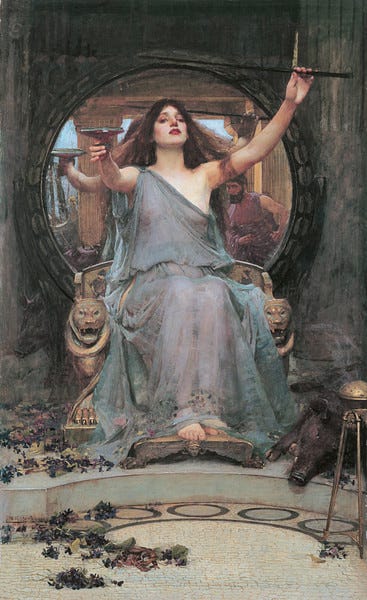Odyssey 2.6: polytheistic pluralism
Summary 8# Man, God, and Society in Western Literature - From Gods to God and Back
Since there is a pantheon of gods in the world of Homer, the question may arise: how can this plurality of life forms be reconciled? This question presupposes that there must be a ranking between the higher and lower worlds. However, it is precisely this desire to impose a hierarchy on the forms of life within a culture that Homer resists. Each of the worlds that the gods in the pantheon open for the Homeric Greeks is good: for example, Helen can be swept into the erotic love affair with Paris (the world of Aphrodite), only to live with Menelaus as the perfect husband afterwards (the world of Hera).
It is precisely from this polytheistic motive that Homer chooses Odysseus as the main character in The Odyssey. Of course, he wants to return home, to his beloved Ithaca. But perhaps even more, he wants to explore new worlds on his journey home. He wants to enter worlds where no one has ever been. Often, his men warn him, but each time his curiosity wins out. Whether it is the world of the Cyclops or the island of Circe, where his men are transformed into swine.
The alternative to polytheistic plurality is a cultural war, where one world within a culture clashes with another world over their right to exist. It is this issue that will come to the forefront in the next work of art we will discuss, The Oresteia by Aeschylus. Homer, however, sees no merit in this. It is no coincidence that the Trojan War arose from a ranking in which Paris had to choose who he found the most beautiful: Hera, Aphrodite, or Athena.
In the sense that plurality is appreciated, we can recognize our contemporary culture. Even in modern liberal democracies, different worlds within the culture can coexist, and one can freely choose to switch between worlds. However, as mentioned before, there is a significant difference: the Homeric Greeks understood themselves in relation to the various gods who, through moods, attuned them to different worlds. Homeric Greeks were thus swept into ever-changing worlds. For modern humans, this is different. Their condition can be described as a ‘laid-back ironic relativism.’ Every life is equal to another. You may lead your life, and I will lead mine. This postmodern attitude lacks a certain seriousness—something that gives one’s life meaning. It seems too experimental, too open. Yet, one does not want a culture where everything is hierarchically ranked from high to low, either. A culture like Medieval Christianity, which we will later encounter in Dante’s Divine Comedy.
At the end of this reflection, we can ask ourselves: what is a middle ground between a culture that is too open or too closed? Nietzsche writes in The Gay Science that the things you cannot or must not laugh at in a culture are sacred. In Western postmodern culture, you can laugh at almost everything. However, the Homeric Greeks did not. When you are attuned to a world, when you are swept away, it is not something to laugh at—it is a sacred experience. The gods thus have a certain degree of authority. But at the same time, if you want to be the paradigmatic example within one of the domains—erotic love (Aphrodite), war (Ares), the household (Hera), rhetoric (Apollo), the hunt (Artemis), etc.—you will also need to develop the necessary skills. Only then can you become 'divine' within that domain, with the help of the gods.




